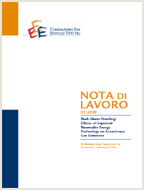Reforming the IPCC’s Assessment of Climate Change Economics

30.01.2016
Q5, Q58
Scientific Assessment, Intergovernmental Panel on Climate Change (IPCC), Scientific Communication
Mitigation, Innovation and Transformation Pathways
Massimo Tavoni
Climate Change Economics, Vol. 07, Issue 01
The Intergovernmental Panel on Climate Change (IPCC) is broadly viewed as the world’s most legitimate scientific assessment body that periodically assesses the economics of climate change (among many other topics) for policy audiences. However, growing procedural inefficiencies and limitations to substantive coverage have made the IPCC an increasingly unattractive forum for the most qualified climate economists. Drawing on our observations and personal experience working on the most recent IPCC report, published last year, we propose four reforms to the IPCC’s process that we believe will lower the cost for volunteering as an IPCC author: improving interactions between governments and academics, making IPCC operations more efficient, clarifying and strengthening conflict of interest rules, and expanding outreach. We also propose three reforms to the IPCC’s substantive coverage to clarify the IPCC’s role and to make participation as an author more intellectually rewarding: complementing the IPCC with other initiatives, improving the integration of economics with other disciplines, and providing complete data for policymakers to make decisions. Despite the distinct characteristics of the IPCC that create challenges for authors unlike those in any other review body, we continue to believe in the importance of the IPCC for providing the most visible line of public communication between the scholarly community and policymakers.
***
Suggested citation: G. Chan, C. Carraro, O. Edenhofer, C. Kolstad, Robert Stavins, Reforming the Ipcc’s Assessment of Climate Change Economics, Clim. Change Econ. 07, 1640001 (2016) DOI: 10.1142/S2010007816400017
